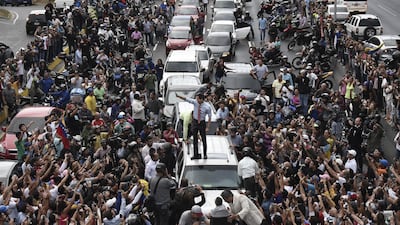Venezuela's opposition leader Juan Guaido vowed on Tuesday to take Nicolas Maduro's place in the presidential palace "very soon," as thousands of people took to the streets of Caracas to protest.
"We need an office to work in, so very soon, and when we have the armed forces totally on our side, we'll go to find my office there in Miraflores. Very soon," Mr Guaido told supporters, who chanted back: "Yes, you can!"
Demonstrators banged pots and sounded car horns at the protest in a square in the east of the capital. Many waved large banners calling on Mr Maduro to go.
"The situation is very difficult, we are hoping that this government will change. We've had enough of this chaos!" said one of the demonstrators, Miguel Gonzalez.
"With courage and strength I asked you to believe in yourselves, that Venezuela would emerge from the darkness, that the end of the usurpation is very close," said Mr Guaido, who is recognized as interim president by more than 50 countries.
Venezuela's state prosecutor, Tarek William Saab, told reporters he would place Guaido under investigation for "his alleged involvement in the sabotage of the Venezuelan electric grid."
It is the first government move against the US-backed Mr Guaido since his return to Venezuela last week after defying a travel ban to visit several allied South American leaders.
Mr Maduro has blamed a devastating multi-day blackout plaguing Venezuela on Washington, and declared "victory" in what he called an "electricity war" triggered by the Pentagon.
He also called for support from allies including Russia and China as well as the United Nations in investigating the US "cyber attack" he said was responsible for the blackout.
While Mr Maduro pointed the finger at Washington, critics have long blamed the government for failing to maintain the power grid.
Mr Guaido, 35, is seeking to capitalise on public anger over the blackout, which has piled misery on a population suffering years of economic crisis and shortages of food and medicine under Mr Maduro.
The youthful opposition chief – locked in a power struggle with Mr Maduro since declaring himself interim president on January 23 – has branded the socialist leader a "usurper" over his re-election in May, widely dismissed as neither free nor fair.
Outlining the case against Mr Guaido, Mr Saab said the opposition leader had disseminated a series of messages that have "stoked violence".
"At this moment he appears as one of the intellectual authors of this electrical sabotage and is practically calling for a civil war in the middle of this blackout."
The US kept up the pressure on Tuesday, with its special envoy on the crisis, Elliott Abrams, saying Washington would soon impose "very significant additional sanctions" on institutions doing business with Mr Maduro's government.
It has already targeted a growing list of individuals and companies linked to the Maduro government, including state oil company PDVSA.
Prompted by Mr Guaido's urging, the opposition-dominated National Assembly declared a "state of alarm" on Monday to pave the way for the delivery of international aid, 250 tons of which has been stuck for a month at Venezuela's borders with Colombia and Brazil.
However, with Mr Maduro controlling the military and security services – which are currently preventing aid from entering the country – he has no means of enforcing it.
Mr Maduro used the military to begin distributing food, water and other assistance in several districts on Tuesday.

